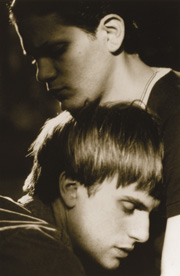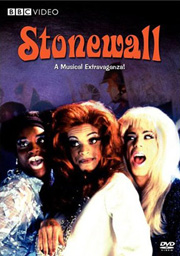It Takes All Kinds
More poignant than historically accurate, ‘Stonewall’ remembers the good old, bad old days.
Feature by Nancy Ford

It begins with La Miranda sharing: “There are as many Stonewall stories as there are queens in Manhattan. And that’s a sh–load of stories, baby.”
Interweaving some of those stories into a compelling narrative with its carefully timed Pride month DVD release is Stonewall.
The 1995 film produced by Christine Vachon and directed by the late Nigel Finch (both out filmmakers) presents a believable though fictionalized portrayal of events in 1969 leading up to one of the most important historic touchstones of our gay culture. Despite the film’s title, its closing depiction of the Stonewall riot itself (which most historians regard as the beginning of the modern gay-rights movement) is almost anti-climatic, taking a backseat to the characters’ back stories told via interconnected subplots.
Pre-AIDS, pre-Fred Phelps, pre-queers win-ning cases in the Supreme Court, Stonewall harkens back to a somewhat-gentler era. But there was nothing gentle about that time for the habitués of New York City’s Stonewall Inn. In their world, cops competed with the mob for “top bully” distinction; when either entered the seedy bar to enforce a state law requiring patrons minimum of “three articles of clothing appropriate their gender as prescribed by nature,” wigs came off, and identity-revealing sunglasses went on. Brutality and humiliation was de rigueur. Stonewall was a powder keg waiting for a wick.
 But Stonewall-era queers weren’t just fighting for their rights. They were also fighting each other (imagine that!) for being too conservative, too flamboyant, too butch, too femme.
But Stonewall-era queers weren’t just fighting for their rights. They were also fighting each other (imagine that!) for being too conservative, too flamboyant, too butch, too femme.
Though the film takes liberties in melding real-life events into a simultaneous timeframe (like a protest march staged by “normal-looking” gays and lesbians in front of Philadelphia’s Independence Hall, which actually took place four years earlier) those liberties aren’t distracting. Instead, they well-illustrate how these individual warring factions of a community, when they worked together, created the perfect storm of dissent that kick-started our movement toward equality.
From BBC Video, which is simultaneously releasing three other gay-themed DVDs for Pride month, including The Buddha of Suburbia, Tchaikovsky, and Daphne. Details: www.bbc.co.uk.
Photo caption: Isn’t it ironic? Frederick Weller (lower right) plays the love interest of Guillermo Diaz, whom we know as the Latin gang banger on Showtime’s Weeds. Also, ironically playing an oppressive cop is Isaiah (“I’m not homophobic!”) Washington, formerly of Grey’s Anatomy.










